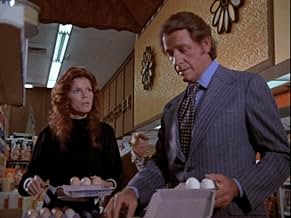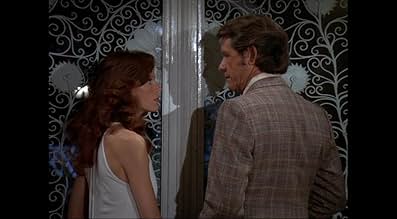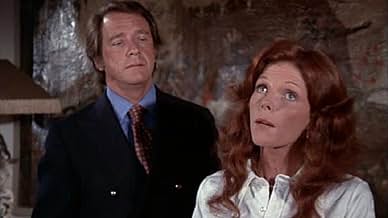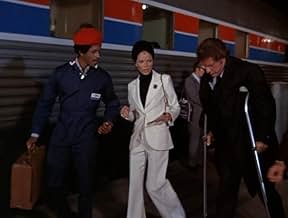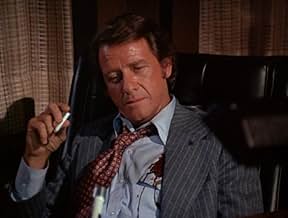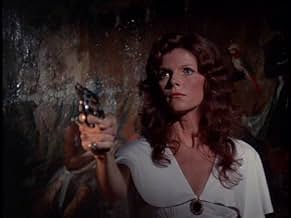Aggiungi una trama nella tua linguaA scheming wife lures an insurance investigator into helping murder her husband and then declare it an accident. The investigator's boss, not knowing his man is involved in it, suspects murd... Leggi tuttoA scheming wife lures an insurance investigator into helping murder her husband and then declare it an accident. The investigator's boss, not knowing his man is involved in it, suspects murder and sets out to prove it.A scheming wife lures an insurance investigator into helping murder her husband and then declare it an accident. The investigator's boss, not knowing his man is involved in it, suspects murder and sets out to prove it.
- Regia
- Sceneggiatura
- Star
Arnold F. Turner
- Redcap
- (as Arnold Turner)
Rand Brooks
- Conductor
- (non citato nei titoli originali)
Tom Curtis
- Charlie
- (non citato nei titoli originali)
John Furlong
- George
- (non citato nei titoli originali)
Recensioni in evidenza
This remake of the film noir classic about a seductress and an insurance man having an affair of horror, planning the murder of her husband, gives us the same question as just about any remake.
Why the remake? Many remakes are simply film adaptations of classic novels, such as TREASURE ISLAND.
Here, though, we have what is essentially a "homage" to E.G. Robinson and the others, who made the original classic.
The crux of the story is the Columbo style E.G. character. He is always the important one. And Lee J Cobb does a fine job. In fact, he is the the entire show in this one. I don't mean to disparage Richard and Samantha, but they were very bland.
And that was probably the point, to keep them bland.
It still makes for the question "Why the remake?" Lee J Cobb tries to make this his own role. And that's okay. You really don't want to try to mimic a classic. He does okay, but there are times when E.G. just did it perfect. For example, when he says "Closer than that", E.G. was perfect. Cobb, in the effort to make it his own, knows it is taking something away when he adds "much closer", but he doesn't want to be compared too much to E.G.'s perfect portrayal.
Which is why you don't really want to remake a classic film noir.
Why the remake? Many remakes are simply film adaptations of classic novels, such as TREASURE ISLAND.
Here, though, we have what is essentially a "homage" to E.G. Robinson and the others, who made the original classic.
The crux of the story is the Columbo style E.G. character. He is always the important one. And Lee J Cobb does a fine job. In fact, he is the the entire show in this one. I don't mean to disparage Richard and Samantha, but they were very bland.
And that was probably the point, to keep them bland.
It still makes for the question "Why the remake?" Lee J Cobb tries to make this his own role. And that's okay. You really don't want to try to mimic a classic. He does okay, but there are times when E.G. just did it perfect. For example, when he says "Closer than that", E.G. was perfect. Cobb, in the effort to make it his own, knows it is taking something away when he adds "much closer", but he doesn't want to be compared too much to E.G.'s perfect portrayal.
Which is why you don't really want to remake a classic film noir.
It was hard to watch this film and be totally fair and objective since I am a big fan the original 1944 movie. That, to me and many others, is one of the greatest film noirs ever made. Realizing this is simply a shortened made-for-TV film and that most people had trashed it, I didn't expect much, but you can't help but compare this with the '44 film. Scene after scene, I found myself comparing what I was looking at it, and remembering how it played out with Fred MacMurray, Barbara Stanwyck, Edward G. Robinson and others. Now I was seeing these famous actors playing their famous roles replaced by Richard Crenna, Samantha Eggar and Lee J. Cobb.
When it was all over, I found it wasn't as bad as I had expected but it's no match for the 1944 original. The two main areas in which this made-for-TV film wasn't as good were (1) the electricity between the two leads was missing and (2) being only 90 minutes, they rushed the story with hardly time to develop the plot, characters and chemistry between those leads. Crenna and Eggar were flat, and simply no match for MacMurray and Stanwyck as "Walter Neff" and "Phyllis Dietrichson," respectively.
Where this re-make held its own was in the other characters, such as "Barton Keyes" and "Edward Norton." Cobb was terrific as Keyes and Robert Webber as Norton, head of the insurance company. It also was somewhat interesting to see the time frame changed, so the houses, cars, telephones, dictating machines, etc., were all early '70s instead of mid '40s. Otherwise, the storyline was very similar, just rushed.
However, one viewing was enough and I will happily go back to the original version for the rest of my viewings of this classic story and film.
When it was all over, I found it wasn't as bad as I had expected but it's no match for the 1944 original. The two main areas in which this made-for-TV film wasn't as good were (1) the electricity between the two leads was missing and (2) being only 90 minutes, they rushed the story with hardly time to develop the plot, characters and chemistry between those leads. Crenna and Eggar were flat, and simply no match for MacMurray and Stanwyck as "Walter Neff" and "Phyllis Dietrichson," respectively.
Where this re-make held its own was in the other characters, such as "Barton Keyes" and "Edward Norton." Cobb was terrific as Keyes and Robert Webber as Norton, head of the insurance company. It also was somewhat interesting to see the time frame changed, so the houses, cars, telephones, dictating machines, etc., were all early '70s instead of mid '40s. Otherwise, the storyline was very similar, just rushed.
However, one viewing was enough and I will happily go back to the original version for the rest of my viewings of this classic story and film.
As a big fan of the original film, it's hard to watch this show. The garish set decor and harshly lighted sets rob any style from this remake. The mood is never there. Instead, it has the look and feel of so many television movies of the Seventies. Crenna is not a bad choice as Walter Neff, but his snappy wardrobe and "swank" apartment don't fit the mood of the original, or make him an interesting character.He does his best to make it work but Samantha Egger is a really bad choice. The English accent and California looks can't hold a candle to Barbara Stanwick's velvet voice and sex appeal. Lee J.Cobb tries mightily to fashion Barton Keyes,but even his performance is just gruff, without style.
It feels like the TV movie it was and again reminds me of what a remarkable film the original still is.
It feels like the TV movie it was and again reminds me of what a remarkable film the original still is.
Los Angeles insurance salesman in his late 30s is seduced by the wife of one of his clients, who gives him the idea of taking out an accident insurance policy on her husband without his knowledge. If he's killed, the wife receives $200,000--if he's killed on a train, the amount is doubled. Writer Steven Bochco had the daunting task of compressing James M. Cain's crime novel into a 75-minute movie for television. Bochco must have known how unnecessary the whole idea was, especially since no amount of effort could even hope to get the project out from the shadow of Billy Wilder's classic 1944 version. The three leads (Richard Crenna and Samantha Eggar as the illicit lovers, Lee J. Cobb as Crenna's boss) go through the motions dutifully, but nothing here feels fresh.
Jack Smight directed this TV remake of the original 1944 film, based on James M. Cain's novel, that stars Richard Crenna as Walter Naff, an insurance salesman seduced by a client's wife named Phyllis Dietrichson(played by Samantha Eggar) to murder her husband for the insurance money, with the double indemnity clause giving them twice the payout, though Walter's boss Barton Keyes(played by Lee J. Cobb) is suspicious of Phyllis, convinced she murdered her husband with the help of another man, not knowing that it's Walter... Needless and ineffectual remake still has a good cast and story, but no atmosphere or point at all.
Lo sapevi?
- QuizBilly Wilder (the co-writer and director of the original version, La fiamma del peccato (1944)) and Barbara Stanwyck (who played Phyllis in the original version) both saw the film in their respective homes when it broadcast. When it was over, Wilder immediately phoned Stanwyck, said, "Missy, they just didn't get it right," and hung up.
- ConnessioniVersion of La fiamma del peccato (1944)
I più visti
Accedi per valutare e creare un elenco di titoli salvati per ottenere consigli personalizzati
Dettagli
- Data di uscita
- Paese di origine
- Lingua
- Celebre anche come
- Doppia indennità
- Luoghi delle riprese
- Aziende produttrici
- Vedi altri crediti dell’azienda su IMDbPro
- Tempo di esecuzione1 ora 14 minuti
- Mix di suoni
- Proporzioni
- 1.33 : 1
Contribuisci a questa pagina
Suggerisci una modifica o aggiungi i contenuti mancanti

Divario superiore
By what name was Double Indemnity (1973) officially released in Canada in English?
Rispondi
